THE THREE MESQUITEERS
(Part 1)
Ratings: Zero to 4 Stars.
Two Early Mesquiteers
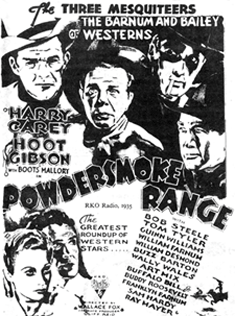   POWDERSMOKE RANGE (‘35 RKO Radio) RKO certainly was not about to launch a series of Three Mesquiteers Westerns, but in September 1935 they packed every Western star they could lay their contracts on for this sagebrush oddity, and therein lies its charm, fame and reputation today because, in reality, it is a rather dull, talky, lethargic, Wallace Fox directed, Adele Buffington scripted western. And other than Tom Tyler’s cold-eyed Sundown Saunders gunman, the performances are pretty routine. The film was wisely advertised for its Grand Hotel all-star cast, thereby receiving playdates in theatres not normally known to book standard B-Westerns. Based on a novel by William Colt MacDonald, Carey is Tucson Smith, Hoot Gibson is Stony Brooke and Big Boy Williams is Lullaby Joslin. A quite different casting approach than that taken by Republic a year later. Also in the star-studded cast are Bob Steele, the aforementioned Tom Tyler (both later to be Mesquiteers themselves at Republic), Wally Wales, Buzz Barton, Art Mix, Buddy Roosevelt, Buffalo Bill Jr., Franklyn Farnum, William Desmond, William Farnum—many in don’t-blink-or-you’ll-miss-‘em cameos. Buffington’s stale plot has Carey/Gibson/Williams opposing corrupt town sheriff Adrian Morris and Mayor Sam Hardy. Main interest in the film comes as the Mesquiteers try to convert gunslinger Tom Tyler to the right side of the law. At first refusing, in the final showdown Tyler takes a fatal shot meant for Carey. POWDERSMOKE RANGE (‘35 RKO Radio) RKO certainly was not about to launch a series of Three Mesquiteers Westerns, but in September 1935 they packed every Western star they could lay their contracts on for this sagebrush oddity, and therein lies its charm, fame and reputation today because, in reality, it is a rather dull, talky, lethargic, Wallace Fox directed, Adele Buffington scripted western. And other than Tom Tyler’s cold-eyed Sundown Saunders gunman, the performances are pretty routine. The film was wisely advertised for its Grand Hotel all-star cast, thereby receiving playdates in theatres not normally known to book standard B-Westerns. Based on a novel by William Colt MacDonald, Carey is Tucson Smith, Hoot Gibson is Stony Brooke and Big Boy Williams is Lullaby Joslin. A quite different casting approach than that taken by Republic a year later. Also in the star-studded cast are Bob Steele, the aforementioned Tom Tyler (both later to be Mesquiteers themselves at Republic), Wally Wales, Buzz Barton, Art Mix, Buddy Roosevelt, Buffalo Bill Jr., Franklyn Farnum, William Desmond, William Farnum—many in don’t-blink-or-you’ll-miss-‘em cameos. Buffington’s stale plot has Carey/Gibson/Williams opposing corrupt town sheriff Adrian Morris and Mayor Sam Hardy. Main interest in the film comes as the Mesquiteers try to convert gunslinger Tom Tyler to the right side of the law. At first refusing, in the final showdown Tyler takes a fatal shot meant for Carey.
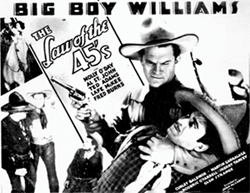   THE LAW OF 45’S (‘35 Normandy/First Division) Released in December 1935. When the Sheriff’s law fails, Big Boy employs the law of the ‘45s to bring down crafty shyster attorney Ted Adams, as nastily smooth as he ever was in any Western. The story itself is a fairly faithful adaptation of William Colt Macdonald’s Three Mesquiteers characters (predating the Republic series by a year). Still, Bob Tansey’s script changes Stony Brooke to Stoney Martin and places him in the role of comic sidekick Al St. John. Big Boy has the lead as Tucson “Two Gun” Smith. Macdonald’s source novel is THE LAW OF THE FORTY-FIVES but print advertising calls the film “The Law of the 45’s”, but the on-screen title is “The Law of 45’s”. THE LAW OF 45’S (‘35 Normandy/First Division) Released in December 1935. When the Sheriff’s law fails, Big Boy employs the law of the ‘45s to bring down crafty shyster attorney Ted Adams, as nastily smooth as he ever was in any Western. The story itself is a fairly faithful adaptation of William Colt Macdonald’s Three Mesquiteers characters (predating the Republic series by a year). Still, Bob Tansey’s script changes Stony Brooke to Stoney Martin and places him in the role of comic sidekick Al St. John. Big Boy has the lead as Tucson “Two Gun” Smith. Macdonald’s source novel is THE LAW OF THE FORTY-FIVES but print advertising calls the film “The Law of the 45’s”, but the on-screen title is “The Law of 45’s”.
Syd Saylor, Ray Corrigan, Bob Livingston
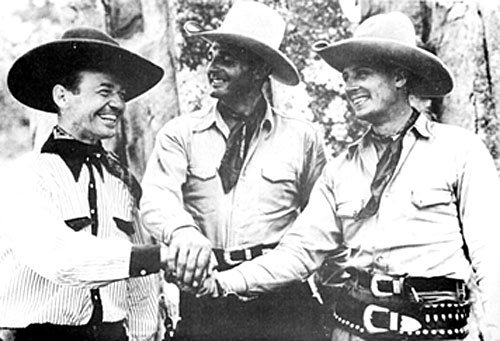
   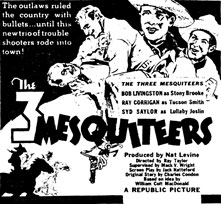 THREE MESQUITEERS (‘36 Republic) The newly formed Three Mesquiteers (Ray Corrigan, Bob Livingston and Syd Saylor! on a motorcycle) round-up range rats for a great start to a terrific series of B-Westerns. Republic made a wise move by quickly (in the second film) replacing Saylor with Max Terhune as Lullaby Joslin. Saylor’s broad humor and his bobbing Adam’s apple just weren’t right for the part. Also notice the different opening theme music apart from the rest of the series. THREE MESQUITEERS (‘36 Republic) The newly formed Three Mesquiteers (Ray Corrigan, Bob Livingston and Syd Saylor! on a motorcycle) round-up range rats for a great start to a terrific series of B-Westerns. Republic made a wise move by quickly (in the second film) replacing Saylor with Max Terhune as Lullaby Joslin. Saylor’s broad humor and his bobbing Adam’s apple just weren’t right for the part. Also notice the different opening theme music apart from the rest of the series.
Max Terhune, Bob Livingston,
Ray Corrigan
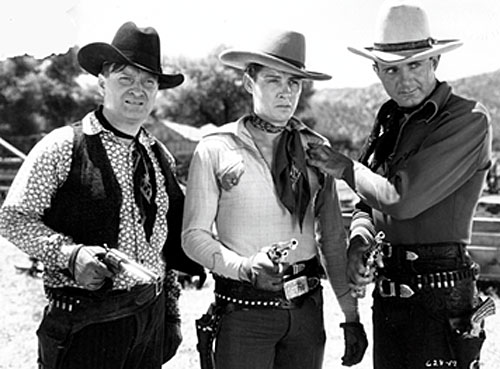
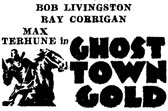    GHOST TOWN GOLD (‘36 Republic) “Crash” Corrigan and the other Mesquiteers, Robert Livingston and Max “Lullaby” Terhune, get involved in a prizefight to help save Kay Hughes and her father’s bank and catch a gang of bank robbers. The trail leads to some wild shenanigans in a spooky old ghost town (Brandeis Ranch) with a crazy old miner (Milburn Morante). Terhune shows how Max acquired his “talking doll”, Elmer, in a rigged game of Three Card Monte. Whatever “magic” Terhune with his dummy Elmer added to the mix is sometimes hard to analyze, but it worked. The trio (with Livingston and Corrigan better dressed than in the first film) clicked and one of the best and longest running series of B-Westerns was off and running. GHOST TOWN GOLD (‘36 Republic) “Crash” Corrigan and the other Mesquiteers, Robert Livingston and Max “Lullaby” Terhune, get involved in a prizefight to help save Kay Hughes and her father’s bank and catch a gang of bank robbers. The trail leads to some wild shenanigans in a spooky old ghost town (Brandeis Ranch) with a crazy old miner (Milburn Morante). Terhune shows how Max acquired his “talking doll”, Elmer, in a rigged game of Three Card Monte. Whatever “magic” Terhune with his dummy Elmer added to the mix is sometimes hard to analyze, but it worked. The trio (with Livingston and Corrigan better dressed than in the first film) clicked and one of the best and longest running series of B-Westerns was off and running.
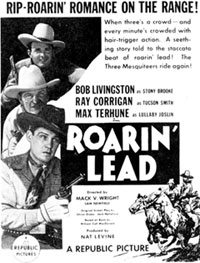   ROARIN’ LEAD (‘36 Republic) The first in the “Mesquiteers-save-the-orphanage” sub-genre. Badmen have rustled cattle from a dozen ranches and exhausted the association’s funds thereby forcing the association to close their orphanage. The Three Mesquiteers have only three days to raise enough money to keep the orphanage open and save the children from being placed in homes of townspeople who only want to adopt them as house labor instead of hiring servants. An orphanage fundraiser with the Meglin Kiddies stops the action dead in its tracks! That’s followed by a ridiculous scene in which Livingston poses as a Swami with mystic powers in an attempt to force a confession from henchman Yakima Canutt. Fast forward through this nonsense and get to the action-packed roarin’ lead showdown. ROARIN’ LEAD (‘36 Republic) The first in the “Mesquiteers-save-the-orphanage” sub-genre. Badmen have rustled cattle from a dozen ranches and exhausted the association’s funds thereby forcing the association to close their orphanage. The Three Mesquiteers have only three days to raise enough money to keep the orphanage open and save the children from being placed in homes of townspeople who only want to adopt them as house labor instead of hiring servants. An orphanage fundraiser with the Meglin Kiddies stops the action dead in its tracks! That’s followed by a ridiculous scene in which Livingston poses as a Swami with mystic powers in an attempt to force a confession from henchman Yakima Canutt. Fast forward through this nonsense and get to the action-packed roarin’ lead showdown.
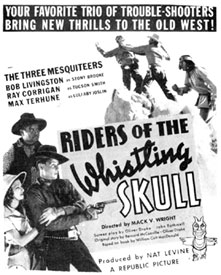     RIDERS OF THE WHISTLING SKULL (‘37 Republic) One of the series’ best outings, featuring a harrowing, imaginative story, high production values, good direction, unusual locations in the Coachella Valley near Mecca, CA, and plenty of expert stuntwork from Yakima Canutt. Perfectly crafted atmospheric “glass shots” make the skull-shaped rock formation known as the Whistling Skull appear to be atop existing peaks in Coachella Valley. Keeping it spooky, ominous drums and an eerie use of distorted shadows are used to introduce a lost tribe led by Chief Thunder Cloud and Iron Eyes Cody. Oliver Drake’s script finds archeologists outfitting a mission to search for their colleagues. Suddenly, the Mesquiteers arrive and the group is told about the lost city of Lukachukai hidden deep in the desert-mountains at the base of a Whistling Skull rock formation and zealously guarded by an ancient lost tribe of Indians. The archeological expedition, guided by the Mesquiteers, sets off to find a man who is held captive by the lost tribe. There are some honestly hair-raising suspense sequences, not the least of which is Corrigan being pursued, bare-chested, by Indian tribesmen across the dangerous rocky landscape. RIDERS OF THE WHISTLING SKULL (‘37 Republic) One of the series’ best outings, featuring a harrowing, imaginative story, high production values, good direction, unusual locations in the Coachella Valley near Mecca, CA, and plenty of expert stuntwork from Yakima Canutt. Perfectly crafted atmospheric “glass shots” make the skull-shaped rock formation known as the Whistling Skull appear to be atop existing peaks in Coachella Valley. Keeping it spooky, ominous drums and an eerie use of distorted shadows are used to introduce a lost tribe led by Chief Thunder Cloud and Iron Eyes Cody. Oliver Drake’s script finds archeologists outfitting a mission to search for their colleagues. Suddenly, the Mesquiteers arrive and the group is told about the lost city of Lukachukai hidden deep in the desert-mountains at the base of a Whistling Skull rock formation and zealously guarded by an ancient lost tribe of Indians. The archeological expedition, guided by the Mesquiteers, sets off to find a man who is held captive by the lost tribe. There are some honestly hair-raising suspense sequences, not the least of which is Corrigan being pursued, bare-chested, by Indian tribesmen across the dangerous rocky landscape.
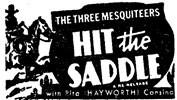     HIT THE SADDLE (‘37 Republic) There’s trouble on the Mesquiteers range as Stony foolishly falls head over heels for a vivacious dance hall singer (Rita Cansino—soon to be Rita Hayworth). While the gold digger nearly breaks up the Mesquiteers’ friendship, a sinister gang wants the law protecting wild horses revoked so they can stage a big roundup. They paint a killer horse, Volcano, to resemble the pinto leader of the wild herd. When Volcano kills the Sheriff it enrages the local populace into wanting to kill the pinto leader and abolish the wild horse protective law. Note the pinto in the stock footage battle with a black stallion is a completely different horse from the one in the rest of the film. Corrigan is the levelheaded, steadying influence and is given more screen time than he’s often afforded. Livingston is still portrayed as the young, headstrong, impetuous Stony—still without the perfectly tailored shirt and pants and snappier blocked hat that soon became a vital part of his being. HIT THE SADDLE (‘37 Republic) There’s trouble on the Mesquiteers range as Stony foolishly falls head over heels for a vivacious dance hall singer (Rita Cansino—soon to be Rita Hayworth). While the gold digger nearly breaks up the Mesquiteers’ friendship, a sinister gang wants the law protecting wild horses revoked so they can stage a big roundup. They paint a killer horse, Volcano, to resemble the pinto leader of the wild herd. When Volcano kills the Sheriff it enrages the local populace into wanting to kill the pinto leader and abolish the wild horse protective law. Note the pinto in the stock footage battle with a black stallion is a completely different horse from the one in the rest of the film. Corrigan is the levelheaded, steadying influence and is given more screen time than he’s often afforded. Livingston is still portrayed as the young, headstrong, impetuous Stony—still without the perfectly tailored shirt and pants and snappier blocked hat that soon became a vital part of his being.
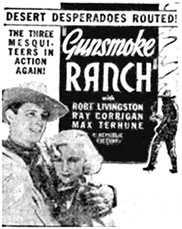   GUNSMOKE RANCH (‘37 Republic) Dishonest politician Kenneth Harlan’s crooked Paradise Land Syndicate lures destitute ranchers wiped out by floods and famine into his Gunsmoke Valley project, promising them they may colonize 10,000 acres of land for a small down payment. The Three Mesquiteers involve themselves for the big finale which has more horse falls per minute than in any Western I’ve ever seen! Livingston “sings”, dubbed by someone who sounds nothing like him. A pretty good Mesquiteers Western is ruined by a very unfunny segment with Oscar and Elmer (Lou Fulton and Ed Platt) at a dance. GUNSMOKE RANCH (‘37 Republic) Dishonest politician Kenneth Harlan’s crooked Paradise Land Syndicate lures destitute ranchers wiped out by floods and famine into his Gunsmoke Valley project, promising them they may colonize 10,000 acres of land for a small down payment. The Three Mesquiteers involve themselves for the big finale which has more horse falls per minute than in any Western I’ve ever seen! Livingston “sings”, dubbed by someone who sounds nothing like him. A pretty good Mesquiteers Western is ruined by a very unfunny segment with Oscar and Elmer (Lou Fulton and Ed Platt) at a dance.
  COME ON COWBOYS (‘37 Republic) When circus owner Ed Cassidy is framed as a counterfeiter by his partner, so he can gain control of the circus, the Three Mesquiteers become guardians of his daughter who is accompanied by her governess. A judge declares one of the Mesquiteers must marry the governess (!) to keep conservatorship of the young girl, or else she will be placed in an orphanage. Excellent example of the screwball western humor and fast action that made the original Mesquiteers team so popular. Their chemistry was never duplicated by any of the 3M trios that followed. At one point, Corrigan, wearing his gorilla costume, takes the head off. This is the only time on film you can see him this way. Corrigan wore the gorilla suit in nearly two dozen jungle and horror films. COME ON COWBOYS (‘37 Republic) When circus owner Ed Cassidy is framed as a counterfeiter by his partner, so he can gain control of the circus, the Three Mesquiteers become guardians of his daughter who is accompanied by her governess. A judge declares one of the Mesquiteers must marry the governess (!) to keep conservatorship of the young girl, or else she will be placed in an orphanage. Excellent example of the screwball western humor and fast action that made the original Mesquiteers team so popular. Their chemistry was never duplicated by any of the 3M trios that followed. At one point, Corrigan, wearing his gorilla costume, takes the head off. This is the only time on film you can see him this way. Corrigan wore the gorilla suit in nearly two dozen jungle and horror films.
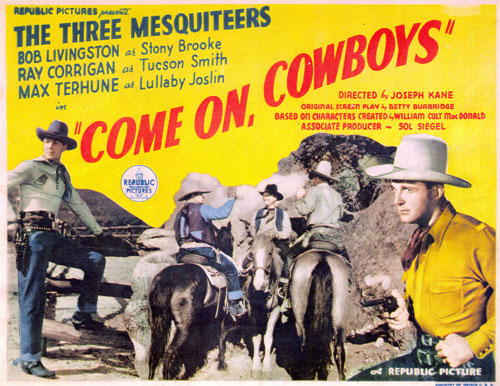
   RANGE DEFENDERS (‘37 Republic) When Stony Brooke’s kid brother is framed on a murder charge of killing leading lady Eleanor Stewart’s sheepman father, the Mesquiteers hide the boy out and head for town where they find crooked lawyer Harry Woods trying to stir up a cattlemen vs. sheepmen war so as to drive the cattlemen out of business. Screenplay is a bit muddled at times but there’s plenty of action to overcome the story shortcomings, with Corrigan’s Tucson given a bit more to do than usual. RANGE DEFENDERS (‘37 Republic) When Stony Brooke’s kid brother is framed on a murder charge of killing leading lady Eleanor Stewart’s sheepman father, the Mesquiteers hide the boy out and head for town where they find crooked lawyer Harry Woods trying to stir up a cattlemen vs. sheepmen war so as to drive the cattlemen out of business. Screenplay is a bit muddled at times but there’s plenty of action to overcome the story shortcomings, with Corrigan’s Tucson given a bit more to do than usual.
Boo Boo: The wanted poster on Stony Brooke’s brother reads “George Brook”, leaving the “e” off the end of his name. Note the large billboards advertising two other ‘37 Republic B’s, “Guns In the Dark” with Johnny Mack Brown and “Gun Lords of Stirrup Basin” with Bob Steele.
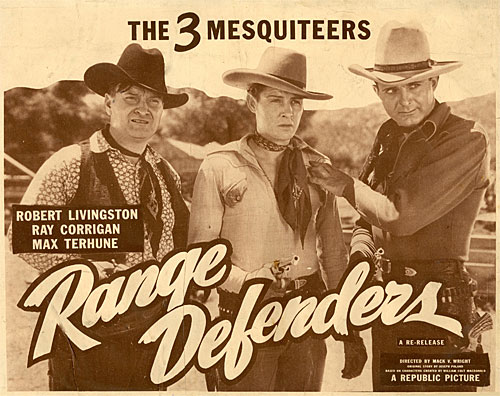
    HEART OF THE ROCKIES (‘37 Republic) A terrific B-Western with quite a different story that addresses adult themes of child abuse and underage incestral marriage. It also contains one of the best fights in B-Westerns between Livingston and Yakima Canutt (it took a day to film the three minute brawl). “Heart…” was different from other B-Westerns in other ways. The Mesquiteers continually flaunt the law by trying to kill bear in a national park, paying others to do so, illegally carrying firearms onto the refuge, and showing little respect for park rangers. Certainly, their motives are clear, but their methods may have sent a bad message to Saturday matinee front row kids. Basic plot has hillfolk led by J.P. McGowan and his clan rustling the Mesquiteers cattle who at first believe bears are killing their stock and hire the mountaineers to kill the Park bears for them. Subplot has vicious Yakima Canutt trying to marry the underage stepdaughter of McGowan. Yet another plotline has Maston Williams’ stepson (Sammy McKim), who admires the Mesquiteers, abused by Williams. The abusive Williams even kills one of McKim’s pet cubs and uses an adult bear to cover up their rustling. All these multiple plot ideas are neatly woven by director Joe Kane into one of the best B-Westerns of the ‘30s. HEART OF THE ROCKIES (‘37 Republic) A terrific B-Western with quite a different story that addresses adult themes of child abuse and underage incestral marriage. It also contains one of the best fights in B-Westerns between Livingston and Yakima Canutt (it took a day to film the three minute brawl). “Heart…” was different from other B-Westerns in other ways. The Mesquiteers continually flaunt the law by trying to kill bear in a national park, paying others to do so, illegally carrying firearms onto the refuge, and showing little respect for park rangers. Certainly, their motives are clear, but their methods may have sent a bad message to Saturday matinee front row kids. Basic plot has hillfolk led by J.P. McGowan and his clan rustling the Mesquiteers cattle who at first believe bears are killing their stock and hire the mountaineers to kill the Park bears for them. Subplot has vicious Yakima Canutt trying to marry the underage stepdaughter of McGowan. Yet another plotline has Maston Williams’ stepson (Sammy McKim), who admires the Mesquiteers, abused by Williams. The abusive Williams even kills one of McKim’s pet cubs and uses an adult bear to cover up their rustling. All these multiple plot ideas are neatly woven by director Joe Kane into one of the best B-Westerns of the ‘30s.
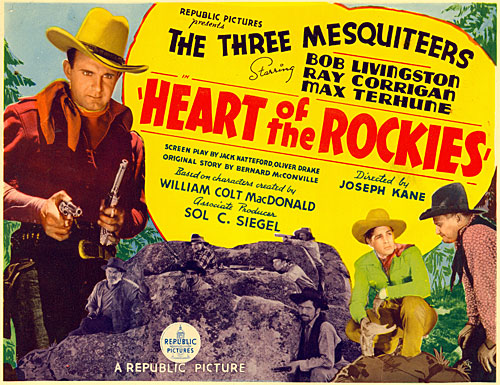
  TRIGGER TRIO (‘37 Republic) Ralph Byrd (as Ray Corrigan’s brother Larry) replaces Bob Livingston (actually injured in a fall—but said to be in Mexico in the film) in the Mesquiteers this one time only as they fight the outbreak of a deadly hoof and mouth disease. Minor role for child star Sammy McKim but a dandy one for Republic’s oft used St. Bernard, Buck. Final showdown comes on the Kernville swinging bridge. In my eyes, this film commits a real no-no when Max “Lullaby” Terhune moves a one mile horse race marker a half mile further down the trail, allowing hero Ralph Byrd to win a horse race he would have otherwise rightfully lost. Good guys shouldn’t cheat, even for a good cause! TRIGGER TRIO (‘37 Republic) Ralph Byrd (as Ray Corrigan’s brother Larry) replaces Bob Livingston (actually injured in a fall—but said to be in Mexico in the film) in the Mesquiteers this one time only as they fight the outbreak of a deadly hoof and mouth disease. Minor role for child star Sammy McKim but a dandy one for Republic’s oft used St. Bernard, Buck. Final showdown comes on the Kernville swinging bridge. In my eyes, this film commits a real no-no when Max “Lullaby” Terhune moves a one mile horse race marker a half mile further down the trail, allowing hero Ralph Byrd to win a horse race he would have otherwise rightfully lost. Good guys shouldn’t cheat, even for a good cause!
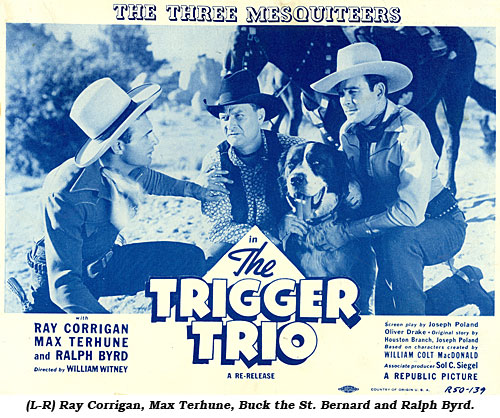
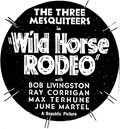   WILD HORSE RODEO (‘37 Republic) Stony Brooke wants to bring Cyclone, a famous wild horse, to the rodeo for which he works in order to make $1,000 to save the ranch he owns with fellow Mesquiteers Corrigan and Terhune. Corrigan prefers not to capture Cyclone, but to let his beauty only be captured on canvas by artist June Martel, with whom Corrigan is infatuated. Problems set in when Cyclone is caught and Livingston has a change of heart about selling him to the rodeo because he’s also falling for Martel. But rodeo owner, Walter Miller has other plans for Cyclone. Watch for Roy Rogers—then billed Dick Weston—singing a Fleming Allan tune, “Madonna of the Trail”. Even the Mesquiteers sing—another good Allan song, “Ridin’ High”. Contrary to some statements, none of the other Sons of the Pioneers are in this Western. WILD HORSE RODEO (‘37 Republic) Stony Brooke wants to bring Cyclone, a famous wild horse, to the rodeo for which he works in order to make $1,000 to save the ranch he owns with fellow Mesquiteers Corrigan and Terhune. Corrigan prefers not to capture Cyclone, but to let his beauty only be captured on canvas by artist June Martel, with whom Corrigan is infatuated. Problems set in when Cyclone is caught and Livingston has a change of heart about selling him to the rodeo because he’s also falling for Martel. But rodeo owner, Walter Miller has other plans for Cyclone. Watch for Roy Rogers—then billed Dick Weston—singing a Fleming Allan tune, “Madonna of the Trail”. Even the Mesquiteers sing—another good Allan song, “Ridin’ High”. Contrary to some statements, none of the other Sons of the Pioneers are in this Western.
     PURPLE VIGILANTES (‘38 Republic) When Trails End becomes a den of iniquity and hoodlums rule the West, the trouble-busting Mesquiteers lead the vigilantes into action. But outlaws take things one step further, wearing the purple robes of the original vigilantes to begin a new reign of terror, leading the citizens to believe the legit vigilantes have taken to the outlaw trail. PURPLE VIGILANTES (‘38 Republic) When Trails End becomes a den of iniquity and hoodlums rule the West, the trouble-busting Mesquiteers lead the vigilantes into action. But outlaws take things one step further, wearing the purple robes of the original vigilantes to begin a new reign of terror, leading the citizens to believe the legit vigilantes have taken to the outlaw trail.
    CALL THE MESQUITEERS (‘38 Republic) This one’s for the action-all-the-way fans as the Mesquiteers run afoul of modern day truck-bandit raw silk thieves led by Eddy Waller in an offbeat role for him as a heavy. When the Mesquiteers are accused of a train robbery and pursued by police, they get help from medicine showman Earle Hodgins (who does his spiel as well as it’s ever been done.) CALL THE MESQUITEERS (‘38 Republic) This one’s for the action-all-the-way fans as the Mesquiteers run afoul of modern day truck-bandit raw silk thieves led by Eddy Waller in an offbeat role for him as a heavy. When the Mesquiteers are accused of a train robbery and pursued by police, they get help from medicine showman Earle Hodgins (who does his spiel as well as it’s ever been done.)
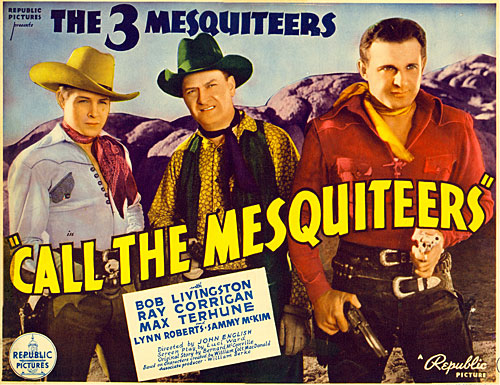
    OUTLAWS OF SONORA (‘38 Republic) Every cowboy lead had the chance to play his evil carbon copy, this was Livingston’s and he plays it for all it’s worth with a vicious cackle, evil sneer and drooping cigarette. Detailed to take $22,000 in cash from the bank to the Cattlemen’s Association headquarters, Livingston is waylaid in the desert by his evil lookalike who holds Livingston hostage while he poses as Stony to collect the money, in the process committing a murder for which Stony is blamed. It’s all sorted out in a rip-roaring saloon brawl finale. This is the B-Western at the top of its form! OUTLAWS OF SONORA (‘38 Republic) Every cowboy lead had the chance to play his evil carbon copy, this was Livingston’s and he plays it for all it’s worth with a vicious cackle, evil sneer and drooping cigarette. Detailed to take $22,000 in cash from the bank to the Cattlemen’s Association headquarters, Livingston is waylaid in the desert by his evil lookalike who holds Livingston hostage while he poses as Stony to collect the money, in the process committing a murder for which Stony is blamed. It’s all sorted out in a rip-roaring saloon brawl finale. This is the B-Western at the top of its form!
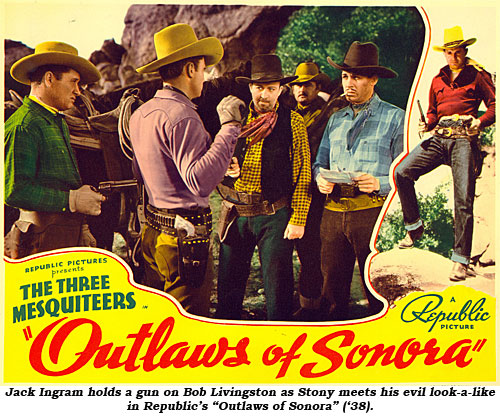
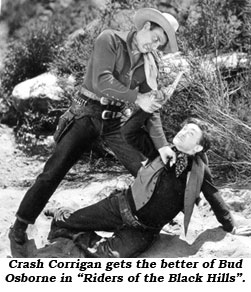   RIDERS OF THE BLACK HILLS (‘38 Republic) There’s a lot of horsin’ around when the Mesquiteers capture Mesquite, a wild horse that is a perfect double for famous race horse Black Knight, a three year old thoroughbred who is horsenapped. After being mistakenly jailed for the theft of Black Knight the Mesquiteers eventually round-up the real culprits. One sticking point for me—in the final handicap horse-race, the Mesquiteers willingly substitute Mesquite for Black Knight knowing it is against all rules of horse racing. They win, collect the purse and get away with the scam which sends a bad message to viewers that it’s okay to cheat if it’s for a good cause. RIDERS OF THE BLACK HILLS (‘38 Republic) There’s a lot of horsin’ around when the Mesquiteers capture Mesquite, a wild horse that is a perfect double for famous race horse Black Knight, a three year old thoroughbred who is horsenapped. After being mistakenly jailed for the theft of Black Knight the Mesquiteers eventually round-up the real culprits. One sticking point for me—in the final handicap horse-race, the Mesquiteers willingly substitute Mesquite for Black Knight knowing it is against all rules of horse racing. They win, collect the purse and get away with the scam which sends a bad message to viewers that it’s okay to cheat if it’s for a good cause.
 HEROES OF THE HILLS (‘38 Republic) Social commentary in a weak entry plot driven and basically actionless til the end. In Livingston’s last in his first group of Mesquiteers adventures, he, Corrigan and Terhune capture escaped convicts and become involved in prison reform when they learn of the poor, over-crowded conditions. HEROES OF THE HILLS (‘38 Republic) Social commentary in a weak entry plot driven and basically actionless til the end. In Livingston’s last in his first group of Mesquiteers adventures, he, Corrigan and Terhune capture escaped convicts and become involved in prison reform when they learn of the poor, over-crowded conditions.
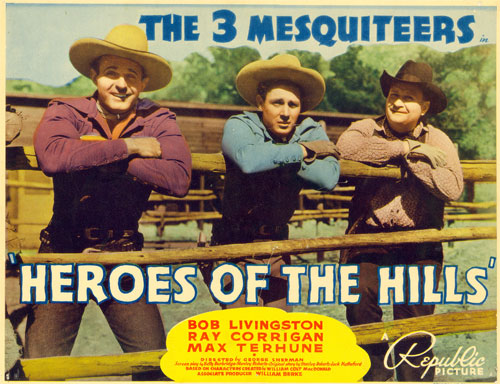
top of page |

